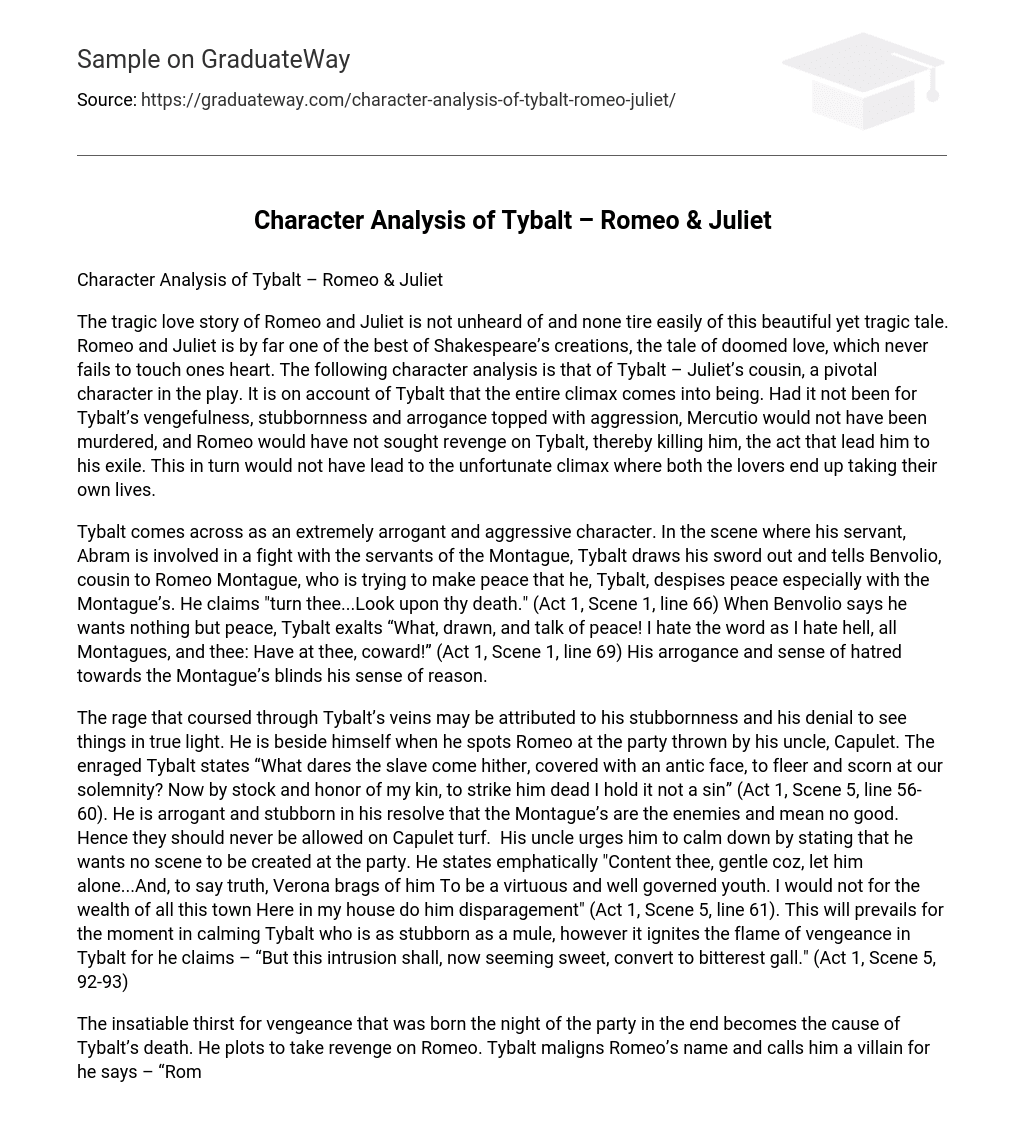The tragic love story of Romeo and Juliet is not unheard of and none tire easily of this beautiful yet tragic tale. Romeo and Juliet is by far one of the best of Shakespeare’s creations, the tale of doomed love, which never fails to touch ones heart. The following character analysis is that of Tybalt – Juliet’s cousin, a pivotal character in the play. It is on account of Tybalt that the entire climax comes into being. Had it not been for Tybalt’s vengefulness, stubbornness and arrogance topped with aggression, Mercutio would not have been murdered, and Romeo would have not sought revenge on Tybalt, thereby killing him, the act that lead him to his exile. This in turn would not have lead to the unfortunate climax where both the lovers end up taking their own lives.
Tybalt comes across as an extremely arrogant and aggressive character. In the scene where his servant, Abram is involved in a fight with the servants of the Montague, Tybalt draws his sword out and tells Benvolio, cousin to Romeo Montague, who is trying to make peace that he, Tybalt, despises peace especially with the Montague’s. He claims “turn thee…Look upon thy death.” (Act 1, Scene 1, line 66) When Benvolio says he wants nothing but peace, Tybalt exalts “What, drawn, and talk of peace! I hate the word as I hate hell, all Montagues, and thee: Have at thee, coward!” (Act 1, Scene 1, line 69) His arrogance and sense of hatred towards the Montague’s blinds his sense of reason.
The rage that coursed through Tybalt’s veins may be attributed to his stubbornness and his denial to see things in true light. He is beside himself when he spots Romeo at the party thrown by his uncle, Capulet. The enraged Tybalt states “What dares the slave come hither, covered with an antic face, to fleer and scorn at our solemnity? Now by stock and honor of my kin, to strike him dead I hold it not a sin” (Act 1, Scene 5, line 56-60). He is arrogant and stubborn in his resolve that the Montague’s are the enemies and mean no good. Hence they should never be allowed on Capulet turf. His uncle urges him to calm down by stating that he wants no scene to be created at the party. He states emphatically “Content thee, gentle coz, let him alone…And, to say truth, Verona brags of him To be a virtuous and well governed youth. I would not for the wealth of all this town Here in my house do him disparagement” (Act 1, Scene 5, line 61). This will prevails for the moment in calming Tybalt who is as stubborn as a mule, however it ignites the flame of vengeance in Tybalt for he claims – “But this intrusion shall, now seeming sweet, convert to bitterest gall.” (Act 1, Scene 5, 92-93)
The insatiable thirst for vengeance that was born the night of the party in the end becomes the cause of Tybalt’s death. He plots to take revenge on Romeo. Tybalt maligns Romeo’s name and calls him a villain for he says – “Romeo, the hate I bear thee can afford No better term than this,–thou art a villain.” (Act 3, Scene 1, line 55). He refuses to head the logical reasoning that Romeo provides, for he is blinded by his desire to murder Romeo. He tells Romeo that he will have to pay for all the injuries he has inflicted on him, Tybalt – “Boy, this shall not excuse the injuries That thou hast done me; therefore turn and draw.” (Act 3, Scene 1, line 65-66). This causes Mercutio to step into the fight which results in Tybalt, stabbing him.
The analysis provided by me makes it clear that Tybalt was an arrogant, stubborn aggressive and vengeful character, who fell prey to these very vices and ended up being murdered by Romeo. Had it not for been Tybalt, the play would probably have had a very different turn of events.





